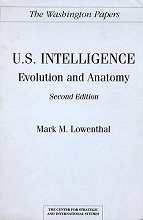
LOWENTHAL : U.S. Intelligence (előszó)
In the past three decades, intelligence has become a frequent topic of public discourse. Scholars dissect its history and publish journals on it. Newspapers advise on how best to use — or not use — intelligence agencies. Television documentaries about spies are commonplace, and intelligence is certainly no longer the closely held secret of government it once was. Moreover, the Central Intelligence Agency is famous; probably more people recognize "CIA" than "IRS."
The end of the cold war has intensified this trend. It has raised the most fundamental question of all: Should the United States even have an intelligence establishment? Although only a few would urge its abolition, many wonder how big an organization it has to be in a world with no perceived threat to U.S. power: They also debate the functions it should perform: gathering information on terrorists or drug lords seems reasonable, but disseminating business intelligence may create more difficulties than the task is worth.
This continuing public interest in intelligence, together with the changes in the U.S. intelligence organization since the first edition of Mark Lowenthal's exemplary book was published in 1984, explains the need for and the value of this second edition. Intended, like the first, to improve public discourse on the subject, it extensively updates and, where necessary, expands the first edition's material without losing its value as a compendium.
The problem facing someone coming fresh to this subject is not, as it was several decades ago, a dearth of information; the problem is a plethora. Needed is a concise guide to the intelligence community, so that a journalist, an academic, or an interested layperson can more easily find his or her way about in the maze of agencies and understand what they do, how they relate to one another, and how they came to be what they are. Bibliographies cannot fill this lacuna, and nearly all the books and articles on intelligence have been either too specific or too general to do so.
Mark Lowenthal filled this gap admirably with the first edition of his enormously useful overview of U.S. intelligence, and this revision maintains that usefulness. Like its predecessor, it is short, so its parts can be surveyed easily. It is well organized, so the relationships can be readily determined. It is pithy, giving only the most needed information. It is selective, dealing with the important agencies but not burdening the text with the multitude of secondary intelligence bodies, whose impact on national decision making is minimal. And it is veracious, imparting a feeling that this is how the intelligence establishment really works.
These qualities stem from Lowenthal's knowledge, capabilities, and experience. His studies for the Congressional Research Service taught him the organization of the intelligence agencies and their intragovernmental links — fundamental to understanding how those agencies work. His experience as a deputy assistant secretary of state dealing with intelligence gave him insight into the practical operations of intelligence — though I sought in vain for some indiscretions or revelations of classified material. His background as a contemporary American historian ensures his putting intelligence into context, both historically and politically. Finally — and this is perhaps the rarest faculty ofall among those who deal with intelligence — Lowenthal can write.
All this has produced an extraordinarily valuable contribution to a major area of government activity that is clearly of national interest. By helping people better understand intelligence, Mark Lowenthal brings this still often secret area into the public discussion that democracy requires.
June1992